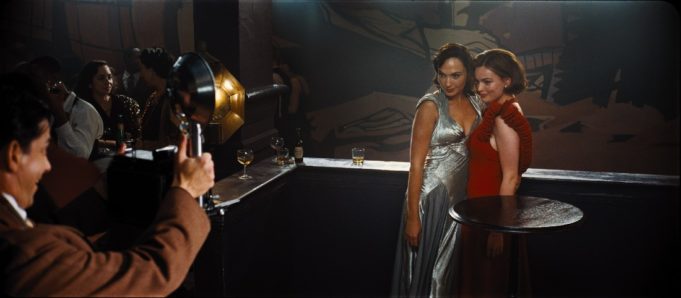Following up the success of his Murder on the Orient Express, Kenneth Branagh has taken the same approach to Death on the Nile by stuffing this deluxe murder mystery with a bunch of stars. Whether it will work the same way in the wake of the pandemic is a question — the only audiences that seem eager to come back to the theaters are the young people. (Case in point: Jackass Forever.) While films pitched at grown-ups are having trouble finding large crowds, I can tell you that Death on the Nile is beset by many of the same issues as its predecessor, and is also a more compact, more somber, and emotionally deeper work.
Our murder victim is Linnet Ridgeway-Doyle (Gal Gadot), a wealthy socialite honeymooning with new husband Simon (Armie Hammer), who invites a vacationing Hercule Poirot (Branagh) on a Nile River cruise with the wedding party. Putting up a good front as a vivacious party host, Linnet is afraid for her life because Jacqueline de Bellefort (Emma Mackey) has crashed the festivities. Jackie was Linnet’s best friend and Simon’s fiancée until Linnet stole him away. She’s been stalking the wedding couple with a gun and acting unhinged, and sure enough, Linnet is found shot through the head while sleeping in her stateroom aboard the boat. Except, Jackie can’t be the killer because shortly before the murder, multiple witnesses see her fly into a jealous rage, shoot Simon in the leg, and be shot up with morphine. Maybe that $2 million diamond necklace that vanished from Linnet’s bedside table provides the motive.
If you know the 1937 Agatha Christie novel that this is based on or the 1978 movie that was made from it, you should know that this plays out quite differently. That previous film sported more Oscar laureates, but this one might just have the deeper cast. Mackey (who has distinguished herself on TV’s Sex Education) gives some good crazy in an early scene where Poirot tries to reason with her and she flashes her .22 and threatens to use it on herself. Russell Brand is cast effectively against type as a sad, bespectacled doctor and former beau of Linnet’s. Rose Leslie is all hospital corners as Linnet’s French personal maid, and Sophie Okonedo drops in as an American blues singer who’s brought in as entertainment. (She plays an electric guitar, which makes her quite musically advanced for 1937. Okonedo lip-syncs to recordings by Sister Rosetta Tharpe.) She possesses her own .22 but denies having fired it, deadpanning, “If I used this on everyone who tried to put me in my place, the world would be full of dead white ladies.” The weak link is Hammer, who, personal issues aside, isn’t convincing as an Englishman.
This balky and overwritten film too often loses track of the suspects, takes too long to get to the murder, and dawdles despite its compressed time frame. Even so, the director comes up with some nice visual touches like the tracking shot down the deck of the ship as a killer disappears from view to be replaced by all the main suspects. The film’s black-and-white prologue sequence showing Poirot being wounded in Belgium seems superfluous initially, but it takes on weight when it’s paired with the final shot. Monsieur Bouc (Tom Bateman), who was Poirot’s co-investigator in Murder on the Orient Express, turns up here as a suspect in the crimes, and Poirot’s interrogation of him is laced with personal betrayal as the detective shouts at his friend, “You lie in my face!” The suspects here like Bouc’s mother (Annette Bening) and the singer’s niece and manager (Letitia Wright) are capable of springing surprises on Poirot. I like that.
The best stuff comes from this film’s conception of Poirot as a traumatized World War I veteran (taking a page from Dorothy Sayers’ Peter Wimsey mysteries) and a guy who’s somewhere on the autism spectrum — he freaks out when a restaurant serves him seven desserts because he can’t eat an odd number of things. It’s instructive when the case’s personal stakes shake the detective out of his professional detachment. This Poirot is a scarred, solitary man with a borderline creepy disregard for other people’s privacy, whose only companions are his cases and his Charles Dickens novels. That isn’t the same Poirot that Agatha Christie wrote, but he is interesting. The tragedy in the murder plot of Death on the Nile finds its mirror in the heartbreak in its detective’s life. No wonder he finds unexpected comfort in the blues. The movie ends with him sitting alone in a club listening to a blues band, a fittingly moody conclusion to an exercise on the loneliness of the long-distance sleuth.
Death on the Nile
Starring Kenneth Branagh and Gal Gadot. Directed by Kenneth Branagh. Written by Michael Green, based on Agatha Christie’s novel. Rated PG-13.












